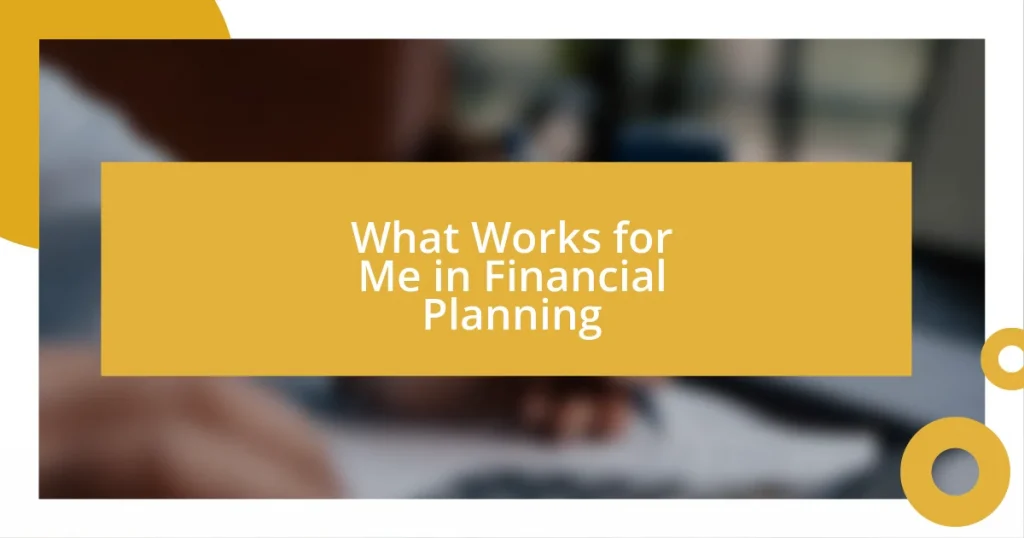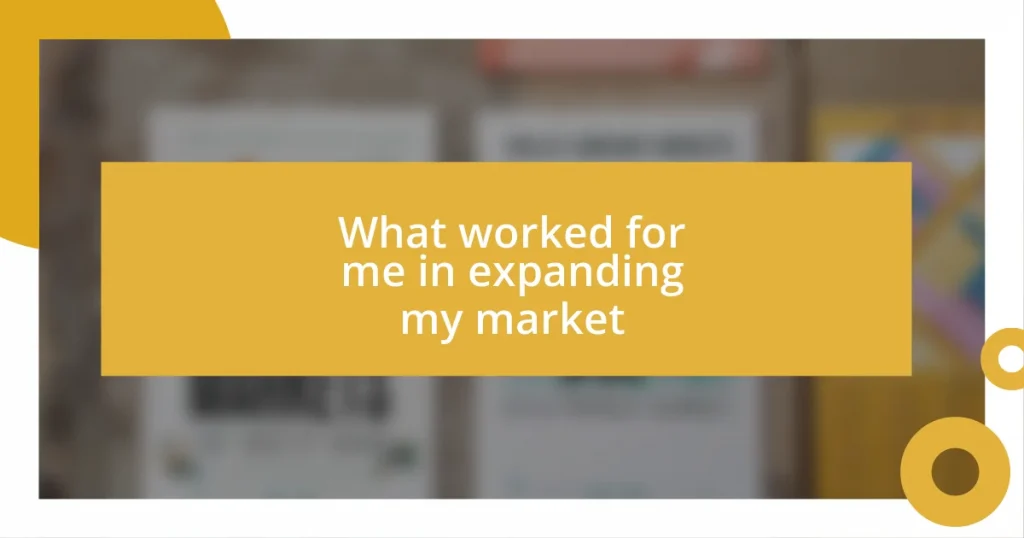Key takeaways:
- Understanding financial goals serves as a guiding map for personal finance, helping to prioritize aspirations and align choices with long-term dreams.
- Developing a budget and tracking expenses effectively enhances financial control, leading to mindful spending and better alignment with financial ambitions.
- Adapting financial plans in response to life changes is crucial, ensuring that strategies remain relevant and effective in achieving evolving personal goals.

Understanding Financial Goals
Understanding our financial goals is like having a map for our financial journey. I remember the first time I sat down with a pen and paper, trying to articulate what I truly wanted. Was it a home, travel, education for my kids, or something entirely different? Defining those aspirations not only guided my planning but also clarified my priorities.
When I think about financial goals, it often feels overwhelming. Are you aiming for short-term comfort or long-term security? I once faced that dilemma when I wanted a new car but realized putting that money into savings could yield greater rewards down the line. Understanding this dynamic helped me see each choice as a stepping stone toward my ultimate dreams.
It’s fascinating how our financial goals evolve over time. I distinctly remember when retirement seemed so far off; it felt irrelevant. But with each passing year, I found that planning for my future became increasingly essential. Have you experienced this shift, too? Reflecting on our changing priorities helps us remain aligned with our values, ensuring that we’re not just chasing numbers, but cultivating a life we genuinely desire.

Developing a Budget Plan
Creating a budget plan has been an eye-opening experience for me. When I first began budgeting, I didn’t realize how illuminating it could be to see where my money was actually going. I started by tracking my expenses, and it was a game changer. I prioritized my needs over wants and quickly discovered that those little daily coffees added up to a significant monthly expense. This awareness allowed me to make purposeful choices that aligned with my financial goals.
To effectively develop a budget plan, consider these key steps:
- List Your Income: Determine your total take-home pay from all sources.
- Categorize Your Expenses: Break down spending into fixed (like rent) and variable (like entertainment) categories.
- Set Realistic Limits: Allocate a specific amount for each category based on your priorities.
- Monitor and Adjust: Regularly check your budget against your spending and adjust as necessary to stay on track.
- Use Budgeting Tools: Explore apps or spreadsheets that can simplify your budget management.
I found that sticking to a budget required diligence, but the feeling of having control over my finances was exhilarating. Each time I successfully kept to my budget, I felt accomplished and empowered. This practice not only aids in achieving my larger financial ambitions but also adds an exciting layer of engagement to my daily spending habits.

Tracking Expenses Effectively
Tracking expenses effectively has transformed my approach to financial planning. Every month, I pull out my notebook, reflect on my spending habits, and jot down every little item—yes, even that spontaneous snack I grabbed on a whim. The process feels like unearthing hidden treasures; I often discover patterns in my spending that I hadn’t noticed before. It’s both surprising and fulfilling. Have you ever realized that those small, seemingly insignificant purchases can accumulate into a hefty sum?
I personally prefer using a digital app for expense tracking, as it allows me to categorize and visualize my spending effortlessly. I remember the first time I linked my bank account to an app; it was like having a personal financial adviser right in my pocket. I could see real-time updates on my grocery spending, entertainment costs, and more. The insights I gained helped me make immediate adjustments. For instance, when I noticed my meal delivery subscriptions were spiraling, I decided to dedicate some time each week to cooking at home instead. It saved me money and sparked a new passion for culinary creativity.
I can’t stress enough the importance of reviewing your tracked expenses regularly. Each week, I take a moment to reflect on my spending. This practice helps me align my current habits with my long-term financial goals. I recall one weekend when I assessed my expenditures, and it hit me that a significant portion went to dining out. It was an eye-opener! By choosing to cook more, not only did I save money, but I also began to enjoy the process of preparing meals. It turned this task into an enjoyable ritual rather than a chore. Keeping a close eye on my expenses has paved the way for smarter choices and greater fulfillment.
| Method | Pros |
|---|---|
| Notebook | Personal touch; easily customizable |
| Expense Tracking Apps | Real-time updates; easy categorization |

Utilizing Investment Strategies
Utilizing diverse investment strategies has been a cornerstone of my financial growth. When I first dipped my toes into investing, I was overwhelmed by the sheer number of options available. I quickly learned that having a balanced approach—mixing stocks, bonds, and even alternative investments—has greatly diversified my risk and potential return. Has any one strategy ever felt like it “just clicked” for you? For me, it was embracing index funds that provided both stability and growth with minimal management.
One of the most exciting aspects of my investment journey has been the realization that patience pays off—literally! I vividly remember investing in a mutual fund based on a friend’s recommendation, and although there were some ups and downs initially, I decided to ride it out. Watching it gradually appreciate over the years was not just rewarding; it brought a sense of confidence in my financial instincts. This experience taught me that time in the market often trumps timing the market.
Another strategy I’ve found valuable is dollar-cost averaging. By investing a fixed amount regularly, regardless of market conditions, I’ve essentially learned to weather the storm of market volatility. It’s like setting up a subscription service for my future self—how cool is that? Whenever I check my investment portfolio, I feel a thrill knowing I’ve consistently built my wealth without trying to predict the market’s mood swings. Trusting this method reinforces my belief that a disciplined approach, even in uncertain times, can yield positive results.

Exploring Retirement Options
Exploring retirement options can be both exciting and daunting. I remember the first time I seriously considered my retirement plan; it felt like stepping into a vast ocean of possibilities. Should I choose a 401(k), an IRA, or perhaps something more unconventional like a solo 401(k)? Each option comes with its own set of rules and benefits, which can be overwhelming at first. I found that breaking down these choices into manageable segments helped me see beyond the confusion.
As I dug deeper, I discovered the merits of contributing to a Roth IRA due to its tax-free growth potential. The idea that my contributions, once taxed, could grow untouched by taxes for my golden years was like finding a hidden gem! I still remember the rush of joy when I realized that I could effectively withdraw that money in retirement without worrying about a hefty tax bill. I often think about how crucial it is to start early—time is indeed on my side when it comes to compound growth.
Another vital area I explored was the importance of diversifying retirement accounts. Initially, I focused solely on my employer’s 401(k), but later I embraced the wisdom of adding a traditional IRA to the mix. It’s a balancing act, combining both tax-deferred and tax-free options, and can profoundly shape my financial future. Have you thought about how diversifying could enhance your retirement strategy? For me, it felt like crafting a personalized retirement portfolio that reflects my financial goals and risk tolerance, ultimately setting me up for greater comfort and security down the road.

Managing Debt Wisely
Managing debt wisely is an essential part of financial planning that I’ve come to appreciate through my own experiences. Early on, I was buried under student loans and credit card debt, feeling overwhelmed by the sheer numbers. However, I found that creating a detailed repayment plan helped me take control. The moment I focused on the smallest debts first—what’s known as the snowball method—I felt a rush of motivation. Watching those balances shrink sparked a sense of accomplishment that fueled my determination to tackle the bigger debts.
I also learned that understanding the difference between good debt and bad debt was crucial. Good debt, like a mortgage or education loans, can propel you forward, while bad debt—which often comes from high-interest credit cards—simply weighs you down. I remember feeling anxious every month when those credit card bills arrived, prompting me to scrutinize my spending habits. This process changed how I approached my finances. I started seeing my purchases through a different lens, ultimately leading to more mindful spending. Have you ever thought about how your debt impacts your mental state? For me, eliminating those unnecessary expenses provided clarity and peace of mind, allowing me to focus on my long-term goals.
Finally, I realized the importance of communication in managing debt, especially with my partner. When we first combined finances, it was uncomfortable to discuss our debts, but that vulnerability ultimately strengthened our relationship. We created shared goals, which transformed paying off debt from a solitary burden into a joint mission. How great does it feel to turn a daunting task into teamwork? By regularly checking in on our progress and celebrating small victories together, we found that managing debt doesn’t have to be isolating—it can be a bonding experience that brings you closer together.

Adjusting Plans Over Time
Adjusting financial plans over time is not just a necessity; it’s a reflection of our ever-changing lives. I vividly remember the upheaval when I switched jobs. My financial goals suddenly felt misaligned, and I could no longer ignore the need to reassess my budget and savings strategy. It was like trying to navigate without a map; taking stock and recalibrating were vital to stay on track. Do you ever feel the need to re-evaluate your goals? I’ve found that periodic check-ins can be refreshing and even inspiring.
As life progressed, my priorities shifted, prompting me to embrace flexibility. When I faced unexpected medical expenses, I had to rethink my emergency fund. It wasn’t enough to have a safety net; I needed to expand it. The realization hit hard—financial planning isn’t static. It evolves with our needs and circumstances. Has a life event ever pushed you to adjust your financial plans? For me, it felt empowering to proactively make changes rather than react to challenges, creating a sense of control amidst chaos.
Moreover, I’ve learned that regularly reviewing investments is crucial. I recall a moment when I realized that a chunk of my portfolio was heavily reliant on a single sector. I felt a wave of anxiety wash over me. It pushed me to diversify further, enhancing my financial stability. It’s a balancing act to maintain growth while safeguarding against downturns. Do you examine your investment allocations regularly? Taking the time to assess and fine-tune not only brings peace of mind but also enhances my confidence in my financial decisions.















